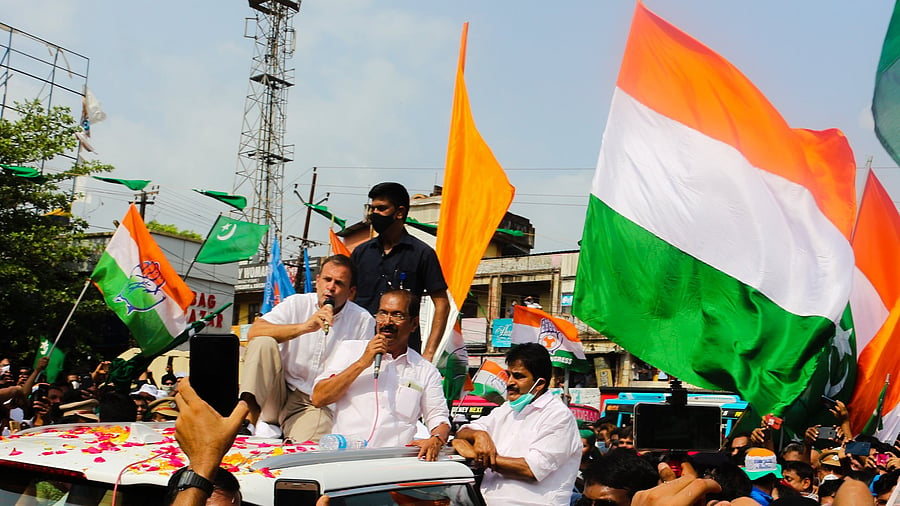
Congress' Sunny Joseph seen with senior leaders Rahul Gandhi and K C Venugopal
Credit: Facebook/Sunny Joseph
On May 9, the All India Congress Committee (AICC) made significant changes in the top echelons of its Kerala unit, months ahead of the crucial local body elections and the Assembly polls set for early 2026.
By appointing Peravoor MLA Sunny Joseph as the president of the Kerala Pradesh Congress Committee (KPCC) and Attingal MP Adoor Prakash as convenor of the United Democratic Front (UDF), the national leadership resorted to ‘social engineering’, a euphemism to justify succumbing to pressures from various caste and religious groups.
Though Joseph is not a political novice, many are sceptical about his ability to pacify belligerent leaders of different factions within the party and bring them along in this most important year for the party in recent times.
After K Sudhakaran’s no-holds-barred attack, following his meeting with Congress president Mallikarjun Kharge, against ‘some leaders’ whom he thought were out to oust him, many felt that the AICC would desist from effecting a change in the leadership so soon. Sudhakaran emphatically told the media that he will remain at the helm till Chief Minister Pinarayi Vijayan is dethroned!
But the AICC leadership, in its bid to placate the Christian community, was not ready to wait. It opted to replace UDF convenor M M Hassan with Prakash, who belongs to the Ezhava community. The party leadership rightly hopes to neutralise the criticism from civil society for toeing the church line by Prakash’s anointment as the convenor of the front.
The Congress in Kerala saw a change in its ‘power structure’ after its 2021 electoral drubbing, with V D Satheesan becoming the parliamentary party leader and Sudhakaran the KPCC chief. This marked the end of the Oomen Chandy-A K Antony era in the Congress’ Kerala unit. Though both Satheesan and Sudhakaran showed a modicum of unity during the initial period, discord soon became visible. The two leaders had no qualms in displaying their rivalry in public, causing considerable discomfort among other leaders and cadre.
The AICC leadership might have thought that continuing with two strong power centres pulling in different directions would hamper the prospects of the party in the upcoming elections.
There is another big political issue staring the Congress in the face — the Christian community abandoning the party in Kerala. Minorities, mainly consisting of Muslims and Christians, account for almost 50% of Kerala’s electorate, and both are considered to be the bedrock of the Congress and the UDF. The Kerala Congress (Mani) left the UDF fold in 2020, and since then, the front has lost its direct connect with the Christian voters. Moreover, a sizable section of Christians is falling prey to the virulent Islamophobic campaign unleashed by Sangh parivar groups. The Bharatiya Janata Party (BJP)’s victory in the Thrissur parliament constituency in 2024 and the saffron party’s impressive performance in some seats in central and south Kerala attest this fact.
If continued unabated, this will put the Congress in an unenviable situation, especially in central Kerala. Hence, the appointment of a devout Christian as the state president. As Joseph carries the blessings of different dioceses, the Congress hopes to regain its Christian vote bank.
Moreover, by replacing Sudhakaran, the AICC addressed two issues: one, dismantling two power centres in the state within the Congress; and, second, it hopes to bridge the gap between the party and the church. How far this will work solely rests on Joseph’s performance. For this, he must play along with Satheesan, without nurturing any ‘larger-than-life ambition’. He will likely also use his proximity with church leaders to regain the loyalty of the community towards the Congress.
In Prakash’s appointment, the Congress ensures Ezhava representation at the leadership level. P C Vishnunadh, A P Anil Kumar and Shafi Parambil, as working presidents, signify a generational shift in the Congress leadership, and a social balancing. All the newly-appointed office bearers are MPs and MLAs, thus the Congress appears to have shelved the ‘one leader, one post’ policy due to political compulsions.
Joseph has multiple tasks at hand. Bridging the gap with the church may be easy, but leading leaders of disparate interests, many of whom are more prominent than he in the party, be it K Muraleedharan or Ramesh Chennithala, is going to be a herculean task.
If the Congress is to remain a force to reckon with in Kerala, it must win the 2026 Assembly elections. The state unit does not have it in it to finish second a third time in a row. Its loss will help the BJP further cement its position in Kerala. All this makes the new appointments important.
N K Bhoopesh is a senior journalist. X:@NKBhoopesh.